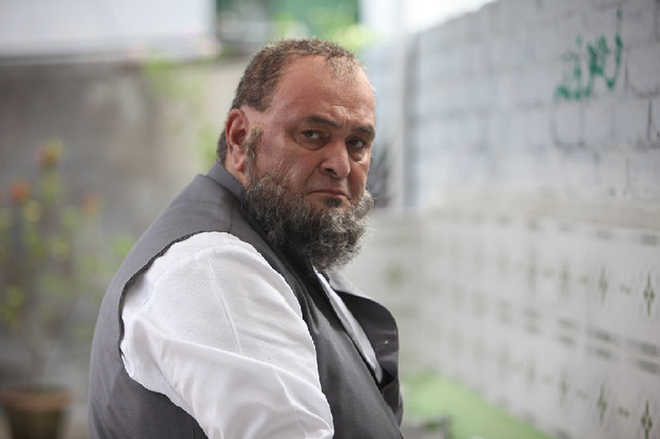
In times of terror: Rishi Kapoor
Rana Siddiqui Zamam
Hum unhe apna banayain kaise
Woh humein apna samajhte hi nahi...
The couplet sums up Mulk, the film that hit theatres last Friday. It prods the subject that India fears to talk about. Or then, at times, takes to the other extreme and unabashedly debates on India and Pakistan, Hindu and Musalman, ‘hum aur woh’. All in the same breath, when it shouldn’t be so.
The message that producer and director Anubhav Sinha conveys through his film is the redundancy of the age-old debate about identity. In the film, there are no rants as such, but some uncomfortable questions have been raised — about our society’s follies and faults, perceptions, and perspectives, realities and lies.
The story revolves around a Muslim family that resides in the bylanes of Varanasi. Shahid (played by Prateik Babbar) turns a terrorist and blasts a bomb for he thinks his community is being wronged in the Hindu-majority nation. His family is harassed by intelligence agencies, which suspect its links with the terrorists and a terror organisation in Pakistan. Friends turn foes and neighbours look at them with suspicion. The beautiful Ganga-Jamuni tehzeeb meets a dead-end. The family fights for its honour in the court.
“This idea has been with me for more than 30 years,” says Anubhav, who lived in Meerut, Muzaffarnagar, Saharanpur, Moradabad and Allahabad, all Hindu-majority areas, during his growing-up years. Riots would often break out in these cities. “I then went to study in Aligarh Muslim University (1982), where I was a Hindu minority. Whenever communal riots broke out there, my Muslim friends would protect me, without making me realise my minority status. I realised that neither majority nor minority is interested in fighting,” adds Anubhav.
He revisited the subject a year back, this time putting it on paper. “When I started seeing disturbing headlines in newspapers pertaining to ‘nationalism,’ I realised it is time to tell the story. The 25-30 years of experience took the shape of words.”
He also unravels the source of hate. “Our elders have passed it on to us, including our parents. And we believed their perceptions to be gospel truth. We don’t even have a Gandhi now who would tell us what is right and wrong. So, when we have to look for the truth on our own, why don’t we just begin with the task?”
The film also mocks at people who believe WhatsApp ‘news’, or that Muslims do not get jobs because of their ideology. Anubhav adds, “Though the religion card has always been played to bag more votes during elections, unfortunately, the rift has widened in the recent past.”
He says that the need of the hour is to clear our doubts by talking to each other. “India is still a developing country and we can’t afford to be stubborn. A healthy dialogue in a society is important for harmony. Baat sab karo, par baat karne ka saleeqa hona chahiye,” the director says.



























